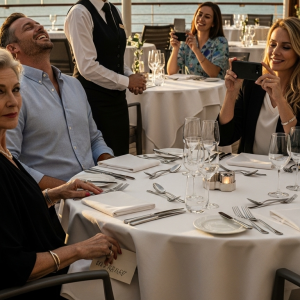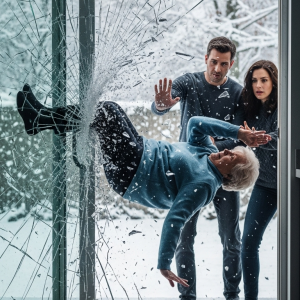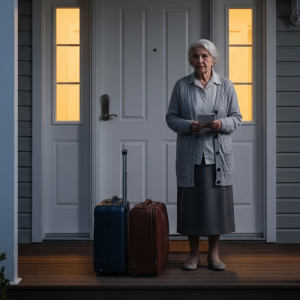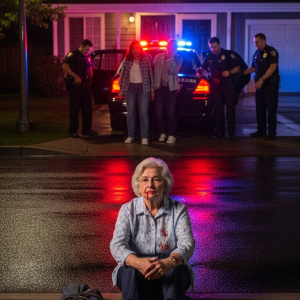The invitation had arrived a month ago, thick and glossy, with a picture of my grandson, Leo, smiling a toothy five-year-old grin. It felt less like an invitation and more like a high-end marketing brochure. Everything my daughter-in-law, Jessica, did had that same polished, performative quality. Even a child’s birthday party had to be an “event,” a curated experience designed for social media.
Still, my heart had swelled with love for Leo. Five years old. I remembered the day he was born, the impossible smallness of his hands wrapped around my finger. I remembered rocking him to sleep when my son, Mark, and a frantic Jessica needed a break. I was there for his first steps, his first words, and the first time he called me “Nana.”
For this milestone, I wanted to give him something truly special. Not another plastic toy that would be forgotten in a week, but something lasting. After weeks of thought, I decided on a contribution to his future. I wrote a check for $6,000, tucking it into a card featuring a cartoon rocket ship. In the note, I wrote: For your biggest adventure yet, my little astronaut. Reach for the stars. All my love, Nana.
The money was intended to open a proper educational savings account for him. It was a significant amount for me, a retired librarian, but it was worth it. It was for Leo. As I sealed the envelope, a familiar, quiet unease settled in my stomach. I knew Jessica would see the amount and smile, but I also knew that, in her eyes, my value was often directly tied to my generosity.
The day of the party was a perfect, sun-drenched Saturday. Jessica and Mark’s backyard had been transformed into a Pinterest-perfect wonderland. There was a bouncy castle in the shape of a dragon, a professional balloon artist twisting creations for a line of giddy children, and a dessert table that looked like it belonged in a Parisian bakery.
I spotted Jessica directing a catering staff member, her posture ramrod straight, a strained but brilliant smile plastered on her face. She was in her element, the flawless hostess of a flawless event. When she saw me, her smile tightened almost imperceptibly at the corners.
“Clara! You made it,” she said, her voice a little too loud, a little too bright. She gave me a brief, bony hug that felt more like a pat-down. “Leo is over by the reptile handler. He’s so excited.”
I handed her the brightly-wrapped gift I had brought, a set of classic illustrated storybooks. The card with the check was tucked inside the first book. “And this is for him, too,” I said, handing her the card. She took it, her eyes flicking over the envelope before placing it on a pristine, designated gift table. “Thank you, Clara. That’s so thoughtful.”
After a wonderful, tight hug from Leo and a brief, distracted kiss on the cheek from Mark, I went to find a seat. All the beautifully decorated tables under the main patio canopy were full, occupied by Jessica’s stylish friends and their families—the “A-list,” as I privately called them. A woman I didn’t recognize, who seemed to be a party coordinator, approached me with a clipboard.
“You must be Clara,” she said, not unkindly. “We have a seat for you right this way.” She led me past the main patio, across a stretch of perfectly manicured lawn, to a small, white pop-up tent. An “overflow” tent. Inside were two flimsy folding tables and a handful of plastic chairs. I was seated next to a distant cousin of Jessica’s I’d met once and an elderly neighbor. We were the island of misfit toys, safely removed from the main event.
I sat for a moment in stunned silence, the cheerful shrieks of children feeling a world away. I watched my son, Mark, mingling with other parents under the main canopy, laughing and holding a craft beer. He glanced over in my direction, gave a brief, hesitant wave, and then quickly turned back to his conversation. He had seen where I was placed. And he had done nothing.
The humiliation was a slow, hot burn. This wasn’t an oversight. This was a statement. I was not part of the picture-perfect family Jessica wanted to project. I was an outlier, an unpredictable element. I was the overflow.
After several minutes of stewing, I stood up. My politeness had been taken for weakness for the last time. I walked back across the lawn, my steps calm and deliberate, and found Jessica near the dessert table, instructing a photographer.
“Jessica,” I said, my voice even. “Could I have a word with you?”
She turned, her smile faltering for a second. “Is everything alright, Clara? The lemonade is self-serve.”
“I’m fine on lemonade,” I replied. “I was just wondering about the seating arrangement. It seems I’ve been placed in a tent outside the main party area.”
Jessica’s expression shifted from strained hostess to condescending matriarch. She let out a small, dismissive laugh, as if I were a child complaining about a broken toy. “Oh, that. We just had so many people RSVP, we needed a bit of overflow space.”
“I see,” I said, my patience wearing thin. “And of all the people here, your son’s own grandmother was chosen for the ‘overflow space’?”
She sighed, placing a hand on my arm in a gesture that was meant to be comforting but felt utterly patronizing. “Well, Clara,” she said, her voice dropping to a conspiratorial whisper, “let’s be honest. You’re kind of a wildcard.”
A wildcard. The word hung in the air between us, sharp and ugly. All the years of biting my tongue, of enduring her passive-aggressive comments, of swallowing my pride for the sake of “keeping the peace,” coalesced into a single moment of absolute clarity. She saw me as a problem to be managed, a potentially embarrassing relative to be quarantined.
I looked past her, at my son, who was now watching us, a worried look on his face. He knew this was a confrontation, yet he remained rooted to his spot, unwilling to intervene. He was leaving me to fight his wife’s battles alone. In that moment, something inside me shifted. The deep well of accommodating love I had for them suddenly ran dry.
I gave Jessica a small, tight smile. I didn’t raise my voice. I didn’t cause a scene. I simply said, “You know what, Jessica? You’re absolutely right.”
Her condescending expression wavered, replaced by confusion. Before she could respond, I turned and walked past her, heading directly for the gift table. It was laden with beautifully wrapped presents and a neat stack of greeting cards. Mine, with the rocket ship, was sitting right on top.
My movements were fluid and unhurried. I picked up the card. The surrounding party guests, sensing a shift in the atmosphere, had grown quiet. The balloon artist paused, a half-twisted pink dog in his hands. I opened the card, pulled out the check I had written with so much love, and folded it neatly, slipping it into my pocket.
I turned back to face a now-gobsmacked Jessica. I held up the empty rocket ship card for her to see. “And I’m wild enough to take this back.”
Her face, which a moment ago had been a mask of smug control, crumpled into disbelief, then morphed into pure, unadulterated fury. Her mouth opened and closed, but no sound came out.
I didn’t wait for her to find her voice. I turned and walked toward the front gate, my head held high. The silence was broken by Jessica’s sharp, hissing voice, directed at my son. “Mark! Do something!”
That command seemed to break his paralysis. I heard his footsteps pounding on the stone walkway behind me, and then his voice, shouting, frantic and laced with panic. “Mom! Mom, wait! What are you doing?!”
I didn’t stop walking. I pushed open the wrought-iron gate and continued down the driveway toward my car. The shouting grew closer, more desperate. It wasn’t the sound of a son concerned for his mother’s feelings. It was the sound of a man chasing after a lost investment.
“Mom, stop!” Mark yelled, finally catching up and grabbing my arm just as I reached my car door. His face was flushed, and his eyes were wide with a mixture of anger and panic. “You can’t just do that! What is wrong with you?”
I calmly removed his hand from my arm. “Let go of me, Mark.”
“No! Not until you tell me what’s going on,” he insisted, blocking my path. “You’re ruining Leo’s birthday! You’re embarrassing me in front of all our friends!”
I looked my son in the eye, and for the first time, I didn’t see the little boy I had raised. I saw a man who had made a choice, a man who had stood by and watched his mother be disrespected to appease his wife.
“I’m embarrassing you?” I asked, my voice dangerously quiet. “I am not the one who sat my own mother at a plastic table in a tent, separate from the rest of the family. You are.”
His face fell, a flicker of guilt crossing his features before being replaced by defensiveness. “It wasn’t like that! Jessica just… she gets overwhelmed with planning. It was just a mistake.”
“It wasn’t a mistake, Mark, and you know it,” I said, the truth of it landing with the force of a physical blow. “It was a message. And your wife delivered it loud and clear. She told me I was a ‘wildcard.’ And you, my son, stood there and said nothing. You saw where I was sitting, and you did nothing.”
He had the decency to look away, unable to meet my gaze. “What was I supposed to do? Start a huge fight in the middle of Leo’s party?”
“You were supposed to be a husband and a son,” I retorted. “You were supposed to stand up for your mother. You were supposed to say, ‘Hey, honey, let’s not seat my mom in the corner like she’s a stranger.’ But you didn’t. Because you are more afraid of your wife than you are of hurting me. And that is a choice you just made very clear.”
Mark was speechless. He simply stood there, his arguments deflated, as I got into my car. “This isn’t about the money, Mark,” I said through the open window, my voice softening slightly. “It’s about the fact that you both seem to think the money is all I’m good for. You want my generosity, but you don’t want me. Not the real me, anyway. You can’t have both.”
I started the car and drove away, leaving him standing in the driveway, a silhouette of indecision. The moment I turned the corner, the adrenaline faded, and the tears I had been holding back finally came. I cried for my grandson, whose special day was now tainted. I cried for my son, who had lost his backbone. And I cried for myself, for the realization that the respect I deserved had to be taken, not waited for.
By the time I got home, my phone had already started buzzing. The first text was from Jessica. It was a tirade of all-caps fury. “HOW DARE YOU. YOU ARE THE MOST SELFISH, VINDICTIVE PERSON I HAVE EVER MET. YOU RUINED YOUR GRANDSON’S BIRTHDAY OVER A SEATING CHART. UNBELIEVABLE.”
Another followed moments later. “YOU OWE LEO THAT MONEY. MARK’S FATHER WOULD BE SO ASHAMED OF YOU.”
Then came the texts from Mark. First, they were pleading. “Mom please come back. We can talk about this. Don’t do this.” Then, when I didn’t respond, they turned angry. “Fine. Be that way. Jessica is right, you always have to make everything about you.”
I turned my phone to silent and set it on the counter. I made a cup of tea and sat in my garden, listening to the birds. The digital storm could rage on without me. I had found my peace in the storm’s eye. The tent had been an insult, but it had also been a gift. It had released me from the obligation to be small and quiet for their comfort.
A week of silence passed. I didn’t answer their calls or texts. I needed the space to process, to solidify the new boundary I had drawn. The $6,000 check sat on my desk, a symbol of my reclaimed dignity. I decided I would still give it to Leo, but on my own terms. I went to my bank and opened a trust fund in his name, with me as the sole administrator. He would get the money when he turned eighteen, with no strings attached and no one else’s hands on it.
On the following Saturday, Mark showed up at my door, alone. He looked tired and haggard. He didn’t yell. He just stood on my porch, his shoulders slumped.
“Can I come in?” he asked quietly.
I led him to the living room. He sat on the edge of the couch, wringing his hands. “Jessica… she’s… well, she’s still furious,” he admitted. “She thinks you should apologize.”
I just looked at him. I didn’t say a word.
He sighed, finally meeting my gaze. “I’m not here for that. I’m here because… you were right. I saw the seating chart beforehand. I thought it was wrong. But I didn’t say anything. I just wanted to avoid a fight. I let you get hurt to keep things easy for myself. And I am so, so sorry, Mom. I’m sorry I wasn’t a better son.”
It was the apology I had waited years to hear. Not just for the tent, but for everything. Tears welled in my eyes. “Thank you for saying that, Mark.”
“I want to fix this,” he said, his voice thick with emotion. “But I don’t know how. Jessica is stubborn. She thinks you declared war.”
“This isn’t a war,” I told him calmly. “This is about respect. From now on, that is the price of admission into my life. Your wife will treat me with civility and basic human decency, and you will ensure that she does. If she cannot manage that, then I will love my grandson from a distance. I will send him birthday cards and Christmas gifts, but I will not subject myself to her disrespect again. The choice is yours and hers to make.”
He nodded slowly, the weight of my words settling on him. He left a little while later, the future of our family hanging in the balance. I don’t know what he will choose. I don’t know if Jessica is capable of changing. But as I watched him go, I felt a sense of profound calm. I was no longer the overflow. I was the wildcard, and for the first time in a long time, I felt wonderfully, powerfully, and unapologetically wild. And I was free.




